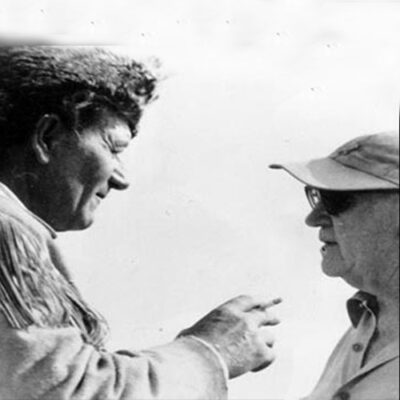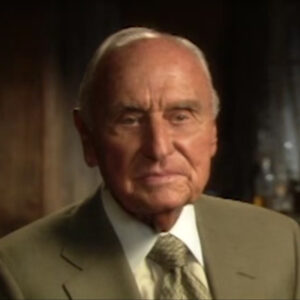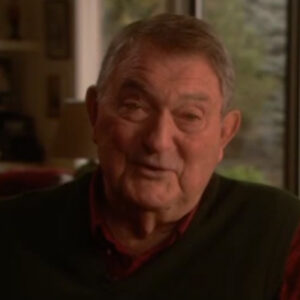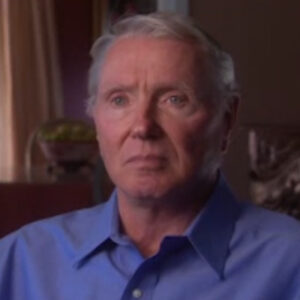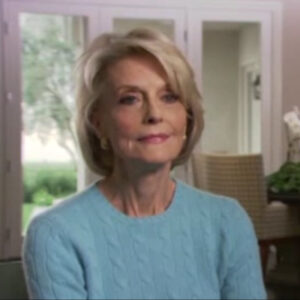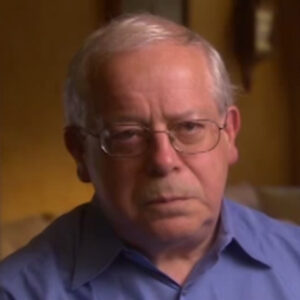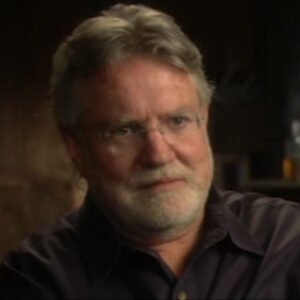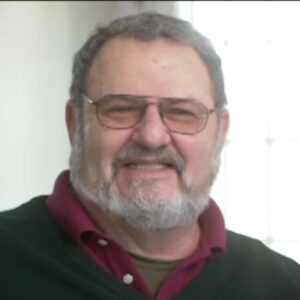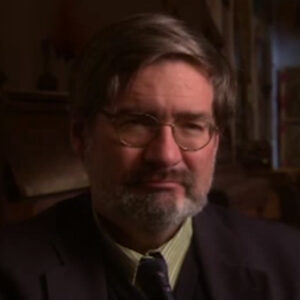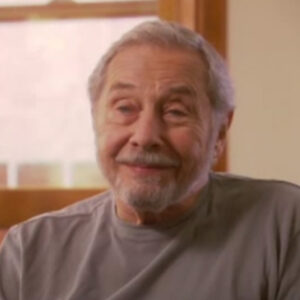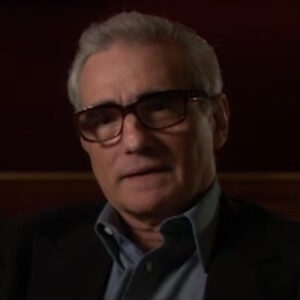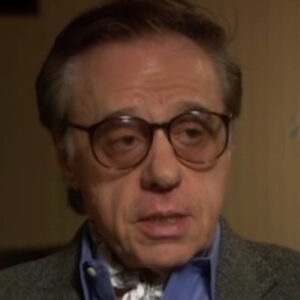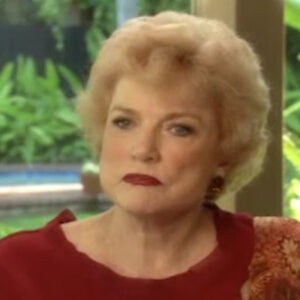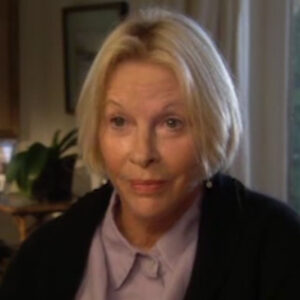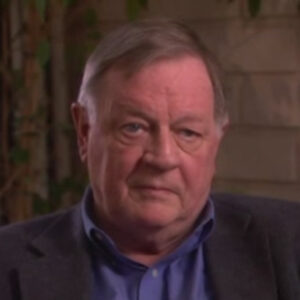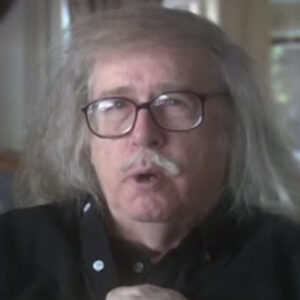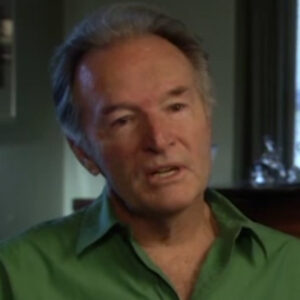Speaker Well, being Harry Carey, Sun was kind of a thrill for me when I was a little boy because. In those days, my dad, we had that big ranch where I was born and and on Sundays he had a rodeo and people come out to watch the rodeo and we’d have a parade around kind of a grand entry at the start before the rodeo started and the Navajo Indians and all that, Wilson and I, right beside my dad and take my hat off in front of them. And that was a big thrill. And it was like, I just worship my pop. And I and and I was trying to emulate him because I had all that red hair and I couldn’t exactly look like my dad. But but that was that was what I remember the most as a little boy. And then as time went along.
Speaker We stay at the ranch for a long time and I mean, until we went back east and.
Speaker In 20.
Speaker Seven and and the next month, right after we got back there. Anyway, my father came down to the lobby of the hotel and the newspaper guys were all over him. And they said he said, what’s the matter? What are you guys doing here? And he said, your ranch was hit with a flood. And that was when the St. Francis Dam broke up San Francisco Canyon there. And that around 600 people, around 600 people, they went to between five and 600 people. It was the biggest dam in the state of California. William Mulholland, build it. And I don’t think there was enough cement in it, but. But it just went down all right through that valley and and it was the worst disaster, even worse actually death wise, and then the San Francisco earthquake. So that was tough. But anyway, we wish it was a well growing up as a kid being. But when I go to school, I never told I didn’t want to be different. I never told them that my father was a movie star. I knew, you know, I went to school, which is my legal name, Henry George Carey. I was so dhobi. And in fact, my father’s name was Henry DeWitt Kerry in those days when my my father was born in 1878, so way back in the days. The short. Name for Henry in those days was Harry, like the King, King, King, Harry and Henry recalled King Harry. So it was. That was how the word Harry got around in.
Speaker And Dobi came, of course, from the red adobe on the ranch because I had already heard and my dad nicknamed me Dovi, what was it that we have to talk about? Is it outside or inside the kitchen? A weed whacker?
Speaker You outside Neulander. But maybe I should get out of here, too, but I don’t think so.
Speaker OK, I’m going to start off again. I have sweet.
Speaker Yeah, when was the first time and what were the circumstances when you met John for the first time I ever met John Ford.
Speaker He scared me to death. And and 20 years later, it didn’t change.
Speaker He still scared me to death. I remember she it was an old timer that my father worked with for a long, long time.
Speaker And he came up to the ranch today with Joe Harris. And he was a nice guy and a wonderful actor. And he worked with my father. And he came up to the ranch for a weekend and he stayed for the rest of his life and and actually use sort of a foreman, he he could I don’t think the ranch would run properly without without Joe. Well, anyway. While growing up, I wasn’t born yet when he was John Ford and Harry Carey were making those Westerns. I mean, those universal Westerns. But growing up, I’d hear this conversation between my dad and Joe Harris about whether Nesto be John Ford was not a pain in the neck.
Speaker He was. And this Nat Yaoundé and my mother finally breezed through it. She’d say, oh, you guys, stop it. You know, I’m tired of hearing this same routine.
Speaker And then all of every once in a while, John Ford would arrive, he he’d always arrive and surprise my father one time. What was.
Speaker We were done with what we call Bill Reid, Kanyon, and a guy called her ball was plowing there.
Speaker My dad was he had some grap on on his plow, that bit Italian moonshine, and he ordered a canteen and my my popper hiddenness pretty good. And it would burn the heck out of me because I was like 11 or 12 years old and they were having their own little party right there in the Red Canyon, also in the station wagon, pulls up and down there. And in this riding that he was in the sand, but he didn’t get stuck. And the chauffeur gets out and then he comes in and my father uttered an expletive and said, Here comes Jack. And I didn’t know. So that’s when he showed up and Ford arrived. And he was a frightening old guy to me. And he wasn’t old. And of course, I guess he was like 38 or 40, but. Hee hee hee hee.
Speaker Look at my dad and he went, mo, mo, mo, like that. And I didn’t know what they’re talking about. Whatever dentally. The night I was born, my father and John Ford were drinking no wood whiskey.
Speaker And that’s what he was doing when he called me a little Melwood, and I hated that, you know, I just hated the recall, a little Melwood, you know, and. He was he was scary to me and as a kid and then like I said earlier, though, you’re scary to me. When I when I grew up.
Speaker But so. So nineteen, 1946. You played then. Laughter Yes. River. Yeah. But most people who aren’t familiar with your history don’t really know when they see three godfathers. It says introducing Harry Carey Jr.. How did you come to get cast in Three Godfathers?
Speaker Well, I got into a godfather.
Speaker I have to back up just a little bit because I said to my father about about six, eight months before he passed away, I said it was about a year because he was still able to get around pretty good. I said, Papa, come here to work for John Ford anymore. And I thought he’d say, oh, he’s too much, you know? But he did. And he just said, he won’t ask me.
Speaker And and I was kind of surprised, and then it was a pause and he said, But you will. And I said, I will. He said, Yeah. He said, After I croak, you will.
Speaker He knew John Ford pretty well and the day my father passed away later on that afternoon. He told my mother that he wanted to remake the three godfathers and he was going to have me play the kid in it. So my dad just hit it right on the nose, you know, and if I had a toe for that story, I never would work for him again. But but so. So John Ford kept saying before preproduction, you know, on three Godfather wardrobe and all that stuff and. And I’d already learned all the lines, I knew every line in the script and and I was all pumped up but apprehensive and he said to me, you’re going to hate me when this picture’s over, but you’re going to give a good performance.
Speaker And he kept saying that you’re going to hate me when I didn’t hate you, when it was over, I hated him after the first day, you know, he just and he had a sadistic streak, which some of the top line directors did, had that quality for some reason or other.
Speaker And he could be. And to you on the first day.
Speaker On the first day, it wasn’t too bad the first day, but by the second, third, fourth day, that’s when it started getting rough and he.
Speaker Oh, he’d give me directions about, for example, where he what direction? Why? Because, you know, we were crossing the desert and we’re staggering around all the time.
Speaker And he mumbled a lot and and then I wouldn’t go in the right direction and. Well, anyway, he wrote me something terrible, he just wrote me some terrible and in the end it was very hot up there, you know, Death Valley in June. And so we go back after work. And I did a Dukan page, Rum and Diet, and Wayne would come over to congregate in my cabin for some reason or other.
Speaker Watban and I shared a cabin and.
Speaker We didn’t drink then because I didn’t drink on a Ford show. No alcoholic beverages, so especially Wayne so.
Speaker We were drinking this main poll and water ice cold poll and water, it tasted delicious, you know, after the day’s work and in Death Valley and I say, do I want to go home?
Speaker I said he just he just he said, no, he loves what you’re doing. I said, Oh, my goodness, don’t say that again. He said, no, he does. He said he wouldn’t he wouldn’t wrap it or print it or anything unless he was satisfied with what you’re doing and.
Speaker To be really honest about it, I don’t think.
Speaker I never cared for myself in that picture because I often wondered why those two bandits, I mean, John Wayne and dromedaries would take a kid along that was like a choirboy. You know, a godly sort of religious kid that almost a mother’s boy kind of guy and on a bank robbing trip, you know. So my first conception of that role was and it was kind of a cocky kid before to have none of that. He didn’t want me to play it like that. He wanted to play it like like I said, like a choirboy. And I still think it was the wrong approach of it. But, you know, he won four Academy Awards.
Speaker I haven’t won any. So I just better let it go at that. What about the death scene? Oh, my God. You must have read my book because after death, tell us about the death scene.
Speaker That was really something I was. I have this death scene and of course, I’m delirious, and then I revert to my childhood and start saying, you know, now I lay me down to sleep and God bless Mom and Daddy. And, well, I got so worked up for that that that I just worked, you know, like like preparing like they do at the Actors Studio. I was just and I knew that when he said action that I was going to be good and and I just was really ready for it. And boom, we start. And I did the scene. And. There wasn’t that he said, cut it and I didn’t hear anything. And I said, oh, well, everybody’s overwhelmed, you know? And it wasn’t it. And he said, Well, Audie Murphy begged me for this part. He said, I wish I had gotten Heidi. He said that was terrible. Well, my goodness, I was destroyed and I want to make a long story short, he he just worked me over something terrible. He finally insulted me and. I finally got so mad and I talked back to him, I got mad and so he said, leave him alone, leave later.
Speaker Well, I was June in Death Valley and on what they call the Devil’s Golf Course. And it was all floods. And I’m laying out there and he made the crew and everybody walk away and they left me laying there.
Speaker And I laid there, like, for 20 minutes maybe. By the time I came back, I mean, it was 130 degrees there. I was kind of goofy. And when they came back and shot it, he got it. I mean, he really got it. And he got what he wanted. Of course. I mean, I didn’t realize that. But of course, it’s a beautiful montage shot because Duke is holding his hat like this to keep the sun out of my eyes so that my face is actually in darkness.
Speaker And.
Speaker Which kind of took away, as far as I was concerned, took a lot away from the scene, but anyway, it was just the way that got worked out. It does seem. But it was it was a hard day. It really wasn’t anything.
Speaker Like I said, it is a story that when you were in a car with Ford, you were sitting behind Ford.
Speaker Yeah, front page my. And what was going on in your mind tells that story?
Speaker Oh, yeah. Well, I got to where I hated him.
Speaker I really hated him. And he always wanted me to call him Uncle Jack because he was at the house when I was born. But but I didn’t want to be his nephew at all. I didn’t want. And so it was it was one of those nice long Chrysler station wagons that they had back in those days. And and he was up in front with the driver, of course. And in the back, he was the biggest star in picture, John Wayne, and then Pedro, who was the biggest star of Mexico. And myself and the three of us are sitting in this back seat, that middle seat, a station wagon and. So I’m looking at the back of John Ford head, you know, that Irish prickled neck and he had those like mine and he had the jug ears that come out like this. And I kept looking at him with such hate, you know, and I thought I wish I had my pistol with me because I could shoot him right now, you know?
Speaker I mean, that’s how he I just boy, I was mad at him. How do you feel? By the time the film was over still.
Speaker Oh, I felt good. I felt good. And in fact, I said to him, some of it might have been a little dishonest, but but he said, oh, what they did was they decided to give up some scenes, you know, and. So we did some short short loops and, you know, like, yeah, I’ll see you later. What are things like that all of a sudden? Here comes the death scene. And they wanted me to dump the death scene, which is all just gasping and. So I thought Ford was saying, now wait a minute, hold it, but he didn’t say anything. So I start to try to look to the death scene, of course, with the way I was breathing it, everything. I got very faint. And I started to keel over and Duke Wayne grabbed me and he took me in where the stairs were to go up to the booth and turn me upside down and sort of blood and run back into my head. And then I went back to the microphone. I tried to do it again. The same thing happened again. And finally, thank heavens, Ford said, Play that again. He said, I’m not going to I don’t want to go through this. And. They played the scene, he said, well, what’s wrong with it? The guy’s got weird noises. He said the wind was blowing. So that way he said, go home. And so that was the end of that. Yeah.
Speaker When you get back on the other side.
Speaker Oh, OK. Oh, that does that. Yeah.
Speaker This is the room.
Speaker What was a typical day like on the fourth set? I mean, people talking about Danny Boy thinking we are going to see an afternoon and see what was a typical day, like a typical day.
Speaker And as we go on on a Ford jet, but not just three godfathers, but all all of them. It was almost like walking into church. And it really was he’d walk in a soundstage especially. But you’d always hear that music, you know, and sometimes it was kind of sad music or those Irish music, or I’d be a little Danny playing the guitar, accordion and and.
Speaker And it was you feel very sort of reverent, you walk on the set and it was like you knew something really big was going on. I mean, very, very touching and very important. And it was just the whole feeling of that said and Ford such were always like that. And and he guided all what his mood was, was what the set was. And if he started acting funny and making gags on the set would get a little noisier, you know. But but he always had the same crew, the same guys, because he never he never was nasty to any of the crew and our camera crew or any of those guys. He just nasty to actors. And so he was so sadistic, I guess is just part of his nature. He could be very sadistic and seemed to enjoy watching people in pain, you know.
Speaker And.
Speaker At any one time, he broke my ribs that was on two road together.
Speaker Ken Curtis and I start to beat up on Dick Widmark.
Speaker And so Jack Ford said by Dick on by Dick on the ankle. And Dick Cheney didn’t have to really do it. I did, I didn’t. So.
Speaker I’m lying down like that and Widmark sitting on his stomach and I’ve got to hold a dick with my leg and Ford. Goes to fix footmarks neckerchief, he’s always fiddling with your wardrobe and Widmaier doesn’t like people touch him, but he didn’t mind for touching him. He puts his knee in my back and he broke my rib.
Speaker And.
Speaker I didn’t know what until I got sort of hurt, but.
Speaker Andy Devine said, I heard him pop, and he said I was 20 feet away, you know, but I mean, that’s the kind of stuff he did, you know, and it was and I had two broken ribs. It was and that was years later, you know, when I was really a member of the club and everything else, but he had he had a nasty streak there.
Speaker But he dedicated three godfathers to to my father, your father?
Speaker Yeah, well, he had a guilty conscience. Why I so he had a guilty conscience because there were roles, for example, in Stagecoach, played by a very fine actor called George Bancroft, the guy just after the kid, Duke.
Speaker A perfect role for my father and.
Speaker There were so many times that there were rules that came along and flawed film that what it suited my dad perfectly, my dad was doing quite well without him.
Speaker But even so, it would have been nice. And especially that stagecoach part and not bankrupt was an excellent.
Speaker But my father would have been better, you know.
Speaker But, you know, Wayne used your dad as a role in a similar role like that. An angel and the Badman.
Speaker Yes. When produced that picture. And in fact.
Speaker One time, Wayne stuck up for me down there in Death Valley Forge, a Ford said, You see that big rock?
Speaker And I said, Yes, true, he said. Then there’s a smaller rock to the left. I said, Yes, sir.
Speaker He said, walk towards that big rock. And when I yelled, Dobi, you often go towards the smaller rock.
Speaker Yes, sir. Action. If I go down straight across the thing.
Speaker And.
Speaker Got cut. And I start walking back and he starts to get on me and Duke when he went right where you told him. And I want to kiss Duke, I’m telling you, he said he went right where you told him and Ford looked at him.
Speaker He said, Oh, that’s great. You produced a movie once. Now you’re directing this one. He said there was talk about angels, bad men, but.
Speaker Do what’s your relationship like with the queen and what was the relationship like with you?
Speaker My relationship with Duke was very good.
Speaker We were good friends and he had a wonderful sense of humor. And and we used to love to tell stories. And he all he wanted to talk about my dad. Because John Wayne idolized my father and the end, especially as an actor and. And I asked him one time what it was that impressed him so much about Harry Carey Senior, and he said, well, he said he always wore a good hat.
Speaker And he said he always had an honesty, insincerity about him and. He said you never felt like he was acting.
Speaker And he said so he said, when I was stumbling around doing those lousy Westerns, you know, he was telling me that his life he said before before Ford put me in state court, he said.
Speaker I got to I couldn’t stand myself on the screen, do said I couldn’t watch myself and he said finally he said, I got to find a role model. And he said, I know I’ll copy Harry Carey. And he said, I use your dad as a role model. He said his walk and and the way he said his lines, you know, the kind of broken speech pattern that they both did, which was really the highest honor I could pay my pop, you know.
Speaker I’ve always been kind of proud of that because it was a Duke doing that right from his heart.
Speaker What was the relationship like over the years, I mean, you worked on a lot of Forge films with Wayne. What was the movie like between Ford and Wayne that you saw evolve over the years?
Speaker Oh, the relationship between Ford and Wayne was sort of like a father and son all over the age. Difference wasn’t all that much, but it still was like that. More like because Wayne called in coach.
Speaker And I’m going back to his football days, you know, was and and he was his coach and.
Speaker And actually and I don’t mean this disrespectfully, but Weymouth’s was a little frightened of him, you know, he was intimidated by him because he he gave him that big push for that stagecoach role and got him out of B movies excuse me, showing he.
Speaker So they had a good relationship, but it was I always felt that I was. Less fearful of Jack Ford and Duke lost for some reason or other because. He could really get on, do you know, and in fact, one time that I heard from a very good source, we read on the picture of when they’re making they were expendable. He started writing when so bad that Robert Montgomery went over to John Ford and said, I know you’re doing this for my benefit, but it’s not amusing and I don’t like it.
Speaker But I started to cry. But it was it made Montgomery really mad and. Because he was just, you know, bullying, bullying, Duke and Duke is not a guy to bully, you know.
Speaker When you were working on she wore a yellow ribbon in Rio Grande and, yeah, the searches, did you ever see for Humiliate Wayne? You remember any incidents?
Speaker Yeah, not much, though, for humiliating Duke Wayne. Not that I can remember really that that he was did he did he picked on him pretty much because I was around, so I forgot to pick on somebody. He picked on me and or Watban, you love to pick on word bond and of course, word bond.
Speaker He just rolled off his back like, you know, water off a duck’s, you know.
Speaker But no, he never Wayne very much in later in those later years. But I guess he really did when he was starting out.
Speaker Smile when he comes to you and Ben Johnson and Claude Jarman Jr.. Yes. You to do that room and writing.
Speaker Oh, yeah. What went on? Real Grandis Ben Johnson and I do that Roman writing.
Speaker And in case people don’t know what that is, is much riding the horses very fast with a foot on each horse and. I never was a great athlete, so, you know, it was it was harder for me to learn that than it was for Ben. And of course, Ben was a champion there all round cowboy besides. But I was a pretty good cowboy myself, but but I wasn’t athletic too much, you know, I let the horse beat Adelaide and so we’re learning how to do this Roman riding. And how does an old wrangler called Hank pass MEANWELL guy and he used to race Roman riding.
Speaker And he.
Speaker He sees me starting to get up on him and then sitting back down, you know, and because you get where like this and you start to push up. To get your foot on the other horse and to stand up and you look between the horses and the roads going 35 miles an hour like this and, you know, and I get a little frightened and I’d sit back down actually with just. Being too scared, I mean, it was I was kind of ashamed of it. So perhaps one day after about the third time I did that, he said, the next time you sit down on that left horse, I’m going to hit you with this rock and get a big rock.
Speaker And that’s how I learned I didn’t sit down and work for a German set for a German junior told me. And they took him only like a week to learn.
Speaker It did. It took him one day. He did it like that. And he course, he was a basketball player, you know, very athletic. No, I remember Claude coming out and doing it right away. He just jumped right up on. And Ben and I were amazed at how fast he did it, that it took a week. He didn’t take that long.
Speaker I have to remind him it was a relationship like with young German junior with you, because in the movie, you and Ben Johnson seem to take him on the air.
Speaker We dash what we did in real life, too. We took him under our wing. We just we we loved him. You just a great kid. And Claude was and and and a good actor. He’s one of those one of those young men that when he grew up from a little boy to manhood, he still was able to act and. I thought his scenes with Wayne and Maureen were beautiful in that picture and. And then he had the box fight, Freddie Kennedy, and so every night after work, he’d have to go and get a boxing lesson from Teddy Kennedy, you know, and shoot that scene where he fights Freddie Kennedy. But. No, he was fine and Ben and I were so fond of him, we had a good time with him.
Speaker There’s a scene in the film where the three of you are singing, saying in tone, oh, yeah, it was.
Speaker That was in the script.
Speaker No, no, no. Most of the good stuff that’s in a Ford film is not in the script.
Speaker How did it come about?
Speaker Well, he heard that he heard a deal. Evans wrote that song and. And. He herded the sons of the pioneers to it. And he thought it would be a good shock for us to say I actually was too ill to modern for 1870, 1880 or whatever it was, but so he had us guys learn the words and sing it and.
Speaker I don’t remember the words anymore, but I remember the feeling, but it was it was a kind of a cute scene in the tent, Daryn. And that San Antonio thing is very cute, Sean, but he was just sort of this movie wasn’t all fun.
Speaker And Games was the first half of the show, the sadistic side of for when you and Ben Johnson were sitting at dinner one night tells that story.
Speaker Oh, well, that was a sad night. And we were. Because John Ford would rather watch Ben Johnson ride a horse than he would do anything else, he just loved it.
Speaker And Ben was so beautiful to watch on a horse. And he he he loved Ben very much, but he lost his temper this time, and we were having dinner in the mess hall, heard to say, just like in the service, and Ford was at the head of the table and Duke was there. And then somebody else was there.
Speaker And then Ben and I were down from Duke across from each other. And so. Everybody, a lot of noise talking going on in there and Ben Ben said.
Speaker Well, there was a shooting out there at the fort and the Indian village and stuff or whatever it was, and then said. There are a lot of shooting went on today, but not too many injured, but the dust. He said to me. And. Ford heard it, and so he went, what? And Ben said, I was talking to Mr. Ford and he said, I know you’re talking to do what you say. He said, I was talking to Dobe so far, got furious. And he said, hey, stupid, I asked you a question because he thought it was a criticism of his direction, you know, and it was a horrible, horrible, horrible moment and.
Speaker Ben got up and walked out and and they never worked together again until way, way later on, shine on them.
Speaker But but it was a terrible, terrible time.
Speaker It was just so, so forward after he did when Ben left informant.
Speaker Sort of swore to himself and he said, don’t go get everything back. I went out and he was he was in the phone place because up and Moab in those days, he had to go to a phone company to make a phone call. And that’s where he was calling home. Tell him that he’d been fired. He thought he’d been fired. And. Of course, nothing was that far away from the truth. So anyway, I went over and I said, Ben, he wants to come back. And he said, I never thought I’d see the day with that old man and make me mad. And I said, well, he has that habit of doing that once in a while. And I said, he wants you to come back.
Speaker You wouldn’t do it. So that was the end of that relationship, you know, it was it was a sad time.
Speaker You also said that you didn’t work for four to six years.
Speaker I didn’t work for Ford for six years. Oh, I know. What happened was we were making the searchers and I was finishing up on the searchers. And he kept saying to me and I had I tested at Walt Disney for the part of Bill Burnett in a show called Spin. And Marty was a kids series. And I got that part. And I remember the day was July 12th, excuse me, July 12th, when I was supposed to start work at Disney. So Ford kept saying, when you have to be at Disney’s Najai 12th Uncle Jack, you when you have to be at Disney’s and I say July 12th, I am Jack White.
Speaker I like that for I don’t know how long and what I what he wanted me to say was not until you’re through with me sir, you know. And which is the logical thing to say.
Speaker And I didn’t say that, and it just ruined my career with Ford for a long time because.
Speaker Finally, the last day I worked and I knew it was my last day, and he did, too, and he. He said something about the way I was getting on the horse, and you can’t you get on a horse anymore. He said, you know, and he starts riding me and riding me about coming out of the house, getting on a horse with a bunch of us run out of gas. And I got very angry and.
Speaker And we finally got the shot and I went back to the hotel, to them, to the motel and went down to the stunt guys and started having a few beers with the stunt guys. And I didn’t say goodbye to him or anything. And I left the next morning for home and Walt Disney’s. And it was a big mistake and nasty thing to do, but I was so mad at him. Because you would write me so bad and. So I think that was the reason I didn’t work for him and also I didn’t get the right answer, you know, either way, before we get to, you know, two to hold together yet, but that was a lot better than Ben did, you know.
Speaker So, Ben, before we get to know Joe Shinada and Ben worked for him, he shot up shows. But to go together, I thought, oh, my goodness, what’s it going to be like?
Speaker Because it’s been all this time since I worked for him and everything, but but there wasn’t any any Joe, except today we did that fight. And then he had me he really got me worked over.
Speaker And when I got my red broke, when the searches, the searches is one of the most intense performances. And Wayne was very intense in that.
Speaker So, oh, he was fantastic.
Speaker Ducos man was probably too many people. This is Wayne’s greatest performance.
Speaker Absolutely. Was John Wayne in The Searchers, I think gave the greatest performance of his life. And I know he was finding true true grit. And, you know, they gave an award. But but he should have gotten an award for the searchers because that part of Ethan Edwards was he was God’s angry man. I mean, he just was. And he never lost that from the time the first scene until the end of the picture and even. When we come in at night around the dinner table and stuff, he was still almost in that role, he he he just lives that role of peace and Edward. And he was magnificent at best ever. He just was awesome and. Yeah, he was awesome in that picture and.
Speaker And I talked to him about that, and he still loved Yellow Ribbon most, he wasn’t all that impressed with himself in the searches he wore. He just he he said his favorite role was the captain in a yellow ribbon.
Speaker Yeah, but there’s a scene between you and John Wayne in The Searchers where he’s gone out and he’s found your.
Speaker Oh, my. Yes.
Speaker He comes back and he tells me, don’t ever ask me.
Speaker Yeah. What do you want to do? Draw me a picture?
Speaker How long it takes for the director?
Speaker You one time. I’m sorry. You tell us about that scene where he says.
Speaker I come running into the scene, into the scene, all excited and do sitting there with Jeff Hunter and he’s a beautiful guy, Jeff, when I miss him very much and I run and say, I just saw Lucy and all that and I’m all excited and I’m pulling my boots on because I take my shoes off to sneak up by the union camp. And and finally, Wayne says, what you saw wasn’t Lucy. What you saw was a brave and Lucy’s breast. As I found Lucy down across the plane and down there and he said, I wrapped her in my coat and buried her and. And I just go nuts, and I said, what was she, you know, wishy wishy washy? And he says, what do you want me to do? Draw a picture, spell it out and and you live. Don’t ever ask me during. That resonated again what was incredible scene one take. But what happened was when I’d like to take I told you this earlier, he went right and said.
Speaker And he went right, and that was the scene, boy, was it right on the nose, but then there’s some mumbling around back behind the camera and Ford that what’s all the mumbling about? And he said. The camera stopped Mr. Ford.
Speaker He said the cameras that he said yes, he said whereabouts he said right about where Duke says Dr. Adobe was right in the middle of the cameras that.
Speaker And he said so he apologized to Duke and myself. We have to do it again.
Speaker So the scene in the searchers, the camera stopped what happened or the camera stopped when I’m doing this scene with John Wayne, with the he told me in my mind that he found my girlfriend’s body.
Speaker And.
Speaker What had happened was and Ford never found this out. He they killed him. Excuse me, have what had happened was Ford Ward Bond arrived on the set.
Speaker Can we take a break for one second?
Speaker So when we’re doing a scene where where John Wayne tells me that he found my my girlfriend’s body, Lucy’s body. Ford went right and I thought, boy, that’s over with done with, you know, go home happy. And there was some mumbling behind the camera and towards the bus what seemed what Frank, because he knew there was something wrong and they said the camera stopped Mr. Ford. And he said the camera. He said, yes, sir. Were. And he said right about the middle of the scene. Well, what had happened was. Ward Bond arrived on the set and decided needed a shave electricity. It was electric shaver. He unplugged the camera and plug the electric shaver in and starts shaving. They never told John Ford that because he had killed him, but or had him shot or something. But it was it was so typical toward bond, you know, just big braggadocio.
Speaker Ward and.
Speaker Anyway, he never learned that, so we had to do it again, I’d do this shot again, but it worked out OK.
Speaker You were after two of us together. You play the same order with four.
Speaker Yes. Was, yeah. Yeah. We both had a lot of writing it.
Speaker What was it like to those last stages of his career?
Speaker He was a lot better, easier to get along with in his last days of his career because.
Speaker He didn’t seem to be as quite as intense and temperamental as he used to be, and he seemed to be more relaxed and have more like he did on a vacation and.
Speaker I don’t remember him being nasty too much at all on an old picture.
Speaker Even ever going back, starting with two work together and. He took a liking to Dick Widmark and of course, Dick Widmark worshipped him and just loved him and. It was a funny thing before two wrote together. It was always this my mother, Ali, and John Ford were a year apart and they’d known each other since she was 17 and he was 18. And. They used to fight like the dickens, and they mentioned Bill, I mean, it was just they argued and were sarcastic to one another and everything, but actually they loved each other very much.
Speaker And so. I went into Ford’s office one time before you were together started, and he said, I got some bad news and I said, what’s that, Uncle Jack?
Speaker You he said, can’t get Widmark. I said, can’t get Widmark, no, he said, can’t get Widmark. Well, I always said I knew something funny, so. I said, well, how come? What’s wrong? And he said.
Speaker Your mother told me, he said he said, I’m going to use Dick Widmark in the picture and she said, you can’t get with Martin. And so then so then it became a gag. And every time when Mark show up, he’d say, that’s would Mark, you know, I can’t get married. And they got a big kick out of it. But that was typical of my mother.
Speaker By this stage in 43, at the last minute, Wayne was down on his grief. Oh, yeah, I had the relationship changed.
Speaker I mean, Wayne was a major superstar now for his career, was just kind of whittling out. Yeah. So how was it? How was the relationship different?
Speaker Well, I wasn’t I didn’t work on that, but I, I think it was much more relaxed and not quite as he’s not quite as dictatorial, if that’s the right word or is controlling when as he was. And of course, Lee Marvin was a penny like Lee very much, and so I think he just I heard that he had the authority to pick on, you know, I heard that he just was very picked on.
Speaker Terrible was with proces Romeril to be picked on him. Awful. But but. He enjoyed working with Wayne and and and Lee Marvin, they think he got a kick out of that.
Speaker It was the last time you saw John Ford for the last time I saw him was.
Speaker See, when he passed away, it was it was severe through.
Speaker I was back in I was back working on a script with a guy back in Maryland.
Speaker And I knew he’d been quite ill, but I’d been up to see him and and I oh, then I went down to Mexico, I think it was on either Big Jake or Dad went afterwards. The one when he played an old martial anyway, Caillaux, U.S. marshal, and I said to Wayne.
Speaker You know, maybe you ought to go. How long has it been since you saw the old man?
Speaker And he said. Oh, I don’t know, quite a while, and I said he’s very sick and he says he’s not sick. He says he can’t get a job, so he’s making people feel sorry for him. And he just went, I said, Duke, he’s really sick. And but, you know, that was his answer. He did not, you know, show. God love him, he went he had to go back to California for something or other and he went back and he went over to see Jack Ford and of course, he was very ill. And he came back and he says, you were right. He’s very sick. And he said, you know, I’m sorry I didn’t agree with you. But anyway, that was. So I saw him the last time I saw Uncle Jack Ford was.
Speaker About, I guess, about five weeks before he passed away for maybe a month. And. I don’t know who was with him when he. Oh, I know. Just mostly family, I think, because. But it had already struggles with him. British robocalling. And which is only right, because he just. Adored Woody, and they were very close and. So. I think what he was holding his hand when he passed away.
Speaker He.
Speaker Because you got the last rites, I know, just a couple of days before he passed away, so. And Lindsey Anderson, the British director, that was a mutual friend, I work for Lindsay once, Betty Davis and.
Speaker Learning English, and then you want to see him and vice versa with him.
Speaker So I’m I wish I could say that I saw him right towards the end, but I wasn’t I didn’t see him right at the end at all.
Speaker Why do you feel about John Ford after all these years?
Speaker Oh, I love him very much. I loved him very much. I did. I just loved him because he would.
Speaker I know it doesn’t sound that way, but from the things I’ve said, but he used to show you the way that he loved you, he had ways of showing you that and.
Speaker He turn around and say he called me old dope and he say, Geraldo, not yesterday.
Speaker And he he he you know, Pat Pat me. He.
Speaker He I felt very close to man when he did.
Speaker And of course, you worked for him and he’s just. It’s not like working for anybody else with the marvelous experience, you know, you got all the sensory godfathers. But anyway, he was really something. He’s incredible, man.
Speaker Wow. So why do you think he’ll always be remembered as one of the great.
Speaker Yeah, that’s what I was going to I was going to say what was going to be remembered as one of the great directors of all time because of the of the quality of the work that he did and the long lasting the longevity of his movies.
Speaker You know, you can still see on your TV that night and some station of Ford’s film and mostly a Western.
Speaker And you don’t see that with. Joe, Joe McCray, Westerns are the Randers maybe you do on the Western channel, but I mean but not on the network and and they always run to Ford from the yellow ribbon. They run a lot and.
Speaker He he he shot fast, but he had such quality. And humor and pathos, you know, in his films that that he always said that we should make films to entertain people. And not to scare them or to make them see the theater wanting to commit suicide, he said. Maybe they should leave feeling happy.
Speaker And of course, you have to make those kind of pictures, but not according to Ford. You didn’t. And but, you know, of course.
Speaker You need someone like that back in the old days, but he just didn’t remember, you know, the informer and the fugitive and things like that, but there was heavy stuff in the searches as I have.
Speaker And the searches. My goodness. And I think that’s what they say.
Speaker What do you what film you most proud to be in? That’s the one searches, even though I wasn’t in it very long. It’s the one of those proud to be in because I think Howard Hawks is Red River, which I have a small role, but a nice scene. And the searchers and Yellow Ribbon, I think, are the three greatest Westerns ever made. I really do. I think those red ribbon searchers are just in a class by themselves.
Speaker It was the last time he saw John Wayne and.
Speaker Wolf, the last time I saw Duke was quite a long time before he passed away because I didn’t see him on a regular basis, you know, he lived down the beach and I was never down there and I was never on his boat.
Speaker So I’m trying to think.
Speaker He had he’d had two surgeries.
Speaker Hi, I’m.
Speaker I think it was it was when Howard Hawks passed away and I found out when the services were and they were over in Beverly Hills at the Episcopal Church, and I think it was in Beverly Hills and Camden.
Speaker I think one of the street’s. And. I went over there and there was no one there.
Speaker And I walked in and I looked and there’s a big guy up at the altar rehearsing, I think that he’s going to say, and it was Duke.
Speaker And I.
Speaker Said, Hey, and he turned around and he saw me and he says that looks like a panel of shirts you got on there.
Speaker You know, you like the shirt I had. And I said, yeah, it is.
Speaker And he said, I knew it was a penalty. But anyway, then we talked with each other and. He was warm and friendly, was gracious, and that’s the last time I remember seeing him. And that’s a long time before he passed away, but.
Speaker And he’s still considered a big star.
Speaker Oh, yes, yes.
Speaker Well, here he got to do a quality. About that, I mean, I worked on 11 phones with him and most of the time was pretty important roles and and.
Speaker But when when he walked on the set in the morning.
Speaker Even after after, say, 25 days of feuding, he was always like the first time you saw him in your life, you just bung it just he had that tremendous presence. And not so much when he was really young, but when he got in his later years, he had this awesome presence and you just want to stare at him all the time because he was just a great looking guy, you know, and.
Speaker And you just you’re awestruck and I would always like that I was doing so because you was very graceful way he walked and moved, you know, and that was practiced and he had learned that. But it worked. You know, he really he really learned it. And he looked marvelous when he moved.
Speaker But I don’t remember the last exact time, I think that was almost the last time I saw him again.
Speaker I’m not sure.
Speaker People people can, you know, sort of think of food and way politically of the same person.
Speaker Oh, my. Yes. I’m glad you brought that up. Nothing could be further from the truth. Me, a Democrat. I’m a Democrat. Don’t get mad at me for this way, but it’s it my father was a Democrat and Wayne was a right wing Republican.
Speaker When we were making she wore a yellow ribbon, it was the election between Truman and and Thomas Dewey.
Speaker And.
Speaker We’re all sitting around the table there in the in this mess. I goulding’s and. And this is why it was very primitive there, still 48 in 1948.
Speaker And somebody was put a plan on what to do. I can’t remember who was anyway, I’m on.
Speaker I’m drooling because he fired McLeods or something anyway. Ford shows up right in the middle of this harangue, you know, by this guy, and he said. You know, all you guys became and he points to two McLaglen and he points to Duke and he just became millionaires under Roosevelt.
Speaker And Duke hated Roosevelt and.
Speaker But nobody said anything, you know, and he says now they’re going we’re going to you know, and now he said. We’re going to vote and he said, are you guys you’re going to vote for fordoing you said he’s not he’s not helping you guys. He said, you know, and he goes on about Harry Truman. Well, nobody said a word, but that’s the way he laid it out. So people always have that conception that, you know, there was a big director here in town. I won’t say his name because, you know, a lot of people are going to see the show, hopefully. But I but they asked me to come over quite a long time ago, two or three years ago, I guess, to come over to his office. And he was a big director. And and I went into his office and he and his wife are sitting there and they glared at me. And so when I came in, I reached over to shake his hand. He wouldn’t shake hands and they stared and glared at me.
Speaker They just glared at me and and then I left.
Speaker I have always kicked myself, but I’m not good at those things said to say, why did you have me come in here? If you just if you want to, you know, I just I mean that I didn’t say anything. I just got up and left.
Speaker And I know that both that director is a very liberal, what you call a very far left type guy and. And and I’ll be darned if I was going to say, look, I’m a.
Speaker I’m not I don’t believe, like Mr. Wayne does.
Speaker You know, and neither did John Ford. But people always said that, you know, they said he was a big reactionary. And I remember hearing Ralph Bellamy, God rest his soul and he says. Well, you know, Fort Wayne with a very right wing and actually supported a Democrat, but what changed him around was was.
Speaker General Widmaier, and he got him thinking other ways, and he didn’t change his registration, but he he became more conservative.
Speaker And so I know he voted for Barry Goldwater and Barry Goldwater’s grave personal friend of our family. So so a wonderful guy. But the time that he was running for president, I didn’t realize that. But anyway, that’s that story. But for basically up until the very end was was a Democrat.
Speaker What about them?
Speaker You know, the blame for pushing them to make them more palatable, if you that you think you think that because.
Speaker Wayne didn’t serve in the service. Oh, and for that, he felt guilty, that sort of pushed him toward being more political and more going toward the right.
Speaker That being more right wing, right wing, we mean Ford was Wayne Wayne, I know Wayne was always right, right, right, even when he was very young, but he always believed that way. And I think because of his dad is probably as for that way. But I know he was always very. Barry and I, Rosebowl, I’ll tell you that and very, you know.
Speaker But, you know, it’s such a wonderful guy that, you know, who can argue whether I’m going to argue with him, my father used to argue with him, but I never did.
Speaker I never did my dad.
Speaker In fact, Doug used to say. God, I love that old man talking about my dad got to love that old man, but he was so damn left, he’d say. I said, well, he was a Democrat, I said, I don’t know. He wasn’t a communist, you know. But in that in some of those guys, you know, if you’re a Democrat, you’re a communist during that McCarthy type thing, you know, you remember Duke was the president of the Motion Picture Alliance.
Speaker Yes, I remember that very well.
Speaker You remember.
Speaker But I didn’t see a lot of him when he decided to I was working with him when he was doing that, they asked me to join that Cliff Landsat coordinator.
Speaker I said no thanks. He said, well, here’s a list of the communists. And he showed me a list of the actors that are on this list that used to be communist.
Speaker And I said there’s at least 15 people and every friend of mine, I know they’re not communists.
Speaker I said that to Cliff, you know, and.
Speaker You know, the cost me a communist who want to overthrow the government, the United States is a terrible accusation and here’s a list of some very respected actors. You know, they’re supposed to be communists. So I said, no, I don’t want to join the alliance. And that. Well, Weinberger, I said, I know, but I don’t want to do it.
Speaker So that was that before it was on the executive committee.
Speaker Well, he resigned, though, was it?
Speaker Well, I don’t know what happened. I don’t know what happened to made him do that. But but I. I know that he came to a decision finally John Ford did, where he didn’t really agree with with what they were doing.
Speaker And he he he quit it. He quit it.
Speaker So actually, I think the first got it got all tied up was word bond, and then because he was a kind of a big wheel in that organization. And then I think Wayne sort of recruited, I mean, boards and recruited the rest of them, you know.
Speaker But.
Speaker Politics is a dangerous subject. You know why?
Speaker Well, I don’t know, I’ve seen people lose their friendships because of, you know, stop being friends with people because of their their politics, which I think is ridiculous and.
Speaker I mean, I know guys that I’m very, very fond of loves, as a matter of fact, that are very conservative Republicans, but that has nothing to do with our relationship.
Speaker You know, and Wayne, even though they have different politics.
Speaker Yeah, well, Ford and Wayne had different politics.
Speaker I know I would, I would.
Speaker Here, Duke, Wayne, talk about. Some of his political views, but I never said anything, you know, and then he didn’t do it very often and. But anyway, it was. It never it never affected our our friendship with Chip. That one period where. Were.
Speaker Where he was angry with me and then, oh, that was then he said, we’re down Durango, Mexico. And he comes over to his table.
Speaker And he got that look on his face like he was going to hit me in the nose, you know, that real mean look on his face, and he said, what are you mad at me all these years for?
Speaker He where he tried to turn it all around because he got caught at me and I found out who the person was. I can’t tell you who it was. It’s a secret, but that that put those thoughts into his mind.
Speaker And I don’t know what it was, but I went to visit Andy McLaglen one time when he was directing Duke in a picture and I had to take a diet over that. I lost 30 pounds and Wayne wanted to diet and but he just glared at me. Well, I know I know what happened and I know who talked to him.
Speaker And it was they just, you know, gave me their business.
Speaker So we glazed over something like that about it.
Speaker Yeah. It was somebody that was jealous and I think just wanted to mess up our friendship, you know, whether the person said say that’s the way it.
Speaker Well, they probably I don’t know what what this person I know.
Speaker I know who was I don’t know what they said to Duke, but I know it was not a pleasant piece of news. And it was like.
Speaker He said some very derogatory about me and something about, you know.
Speaker That it wasn’t it wasn’t wasn’t that I just I don’t like you like being publicized and.
Speaker And it was a very bad, bad time.
Speaker So even though Ford and Wayne may have differences politically, they know that didn’t affect their friendship or would word or who are busy parading around, you know, what is head of the alliance and all that stuff. And board was really dedicated. I mean, but but he was such a good natured, funny guy that, you know, nobody got mad at him, but. Quite a group, quite a group, amazing adventure working on that whole John Ford stock company. It was what I call the John Ford Stock Company.
Speaker And I wrote it. That’s what I wrote the book about. Coming up, Heroes and I.
Speaker Because it is such a unique organ, you know, a group of people and and humorist and creative and marvelous people.
Speaker So.
Speaker It’s an era that will never be the same, you know.
Speaker There would be the same.

